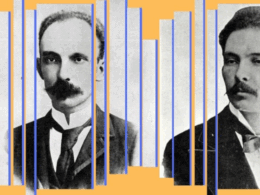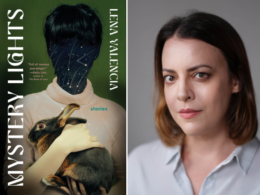
Our “Influences” series returns with a contribution from Ariel Delgado Dixon, whose debut novel Don’t Say We Didn’t Warn You arrives this week from Random House.
A dark coming-of-age tale, Don’t Say We Didn’t Warn You centers on two sisters growing up north of New York City as they contend with the psychological fallout from their traumatic upbringing, in particular the abuse each endured in a wilderness camp for troubled teenagers. Previous “Influences” contributor Kali Fajardo-Anstine calls it “a striking literary arrival” by “a prose stylist with a rare talent marked by atmospheric rhythm,” and the book has been tipped as one of 2022’s debuts to watch by Publishers Weekly and The Millions.
Below, Delgado Dixon revisits a trio of works that have helped make her the writer she is today.
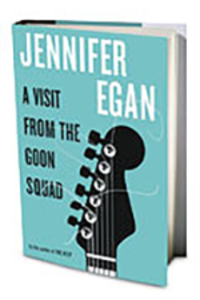
A Visit from the Goon Squad by Jennifer Egan
Have you ever been stalked by a book?
For years, anytime I wandered into a library or bookstore, or clandestinely perused the shelf of a potential paramour, A Visit from the Goon Squad awaited me. I don’t know why I resisted the signs. I was in college then, experimenting with writing, seriousness, responsibility—but unwilling to commit to any.
One frigid winter break, having left Los Angeles for a welcome month back east, I finally picked up a copy and began my love affair with all things Jennifer Egan. There was Sasha, Egan’s kleptomaniac with a heart of gold: chaotic, disarming, and chic—a classic Lower East Side combination. Sasha wants to be good, or at least wants to want to.
“She’d risked everything, and here was the result: the raw, warped core of her life.”
The novel’s chapters and ensemble cast are tethered together as life is, by coincidence and destiny. Jailbreaking convention and genre, one now infamous chapter, “Great Rock and Roll Pauses by Alison Blake,” is delivered via Power Point.
Reading it was revelatory. This was a novel that evaded rules, while preserving a soft heart for its characters—an alchemy I’d been chasing my whole reading, and writing, life. All that collegiate waffling suddenly seemed petty. In my hands was proof of what was possible. Dramatic as I was then (and now?), I told an old girlfriend it made me want to be a writer. It’s a book I still return to when I need to remember. Abandon expectation. Follow a character where they lead.
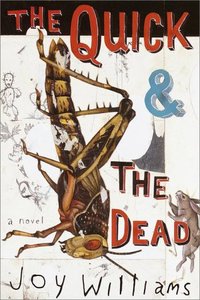
The Quick and the Dead by Joy Williams
During the first year of my MFA, the American genius Joy Williams came to town. She taught a semester-long workshop for our cohort of seven. We sat cross-legged on the brown shag carpet of her Boise rental, while her preferred mood music—the Twin Peaks soundtrack—synthed and gonged until it was time for business. Joy’s German Shepherds barked behind her bedroom door. They were harmless, but had a habit of bowling people over. I only remember the name of one: Noche.
I was a newcomer to Joy’s work, not to mention her renown. When I finally read The Quick and the Dead two summers later, she became a model for how incisive yet mystic fiction can be. The novel opens on young, unimpressed Alice, devoted only to the reverence and brutality of the natural world, and to her best friend Corvus.
She was never going to seek gainful employment again, that was certain. She’d remain outside the public sector. She was going to train herself to be totally irrational. She’d fall in love with a totally inappropriate person. She’d really work on it, but abandon would be involved as well. She’d have different names, a.k.a Snake, a.k.a Snow—no, that was juvenile. She wanted to be extraordinary, to possesses a savage glitter.
So much of fiction’s enchantment lives in the inexplicable. That which may not obviously align with the technical goalposts of plot, pacing, chronology and the like, whispers instead in soft tones, from the spaces in between. Joy’s work taught me to be rigorous and demanding of my stories, but to also let the inscrutable find haven there.
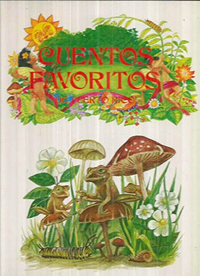
Fairy Tales of Puerto Rico by David García, illustrated by Gus Anavitate
If A Visit from the Goon Squad shepherded me from college, and The Quick and The Dead proposed what MFA ideologies to keep and discard, then the little-known and out-of-print classic Fairy Tales of Puerto Rico may have jumpstarted it all.
My mother used to read these fairytales to my sister and me before bed. A few years ago, I tracked down an old edition published by Taino Press. It contains three tales: “The Tale of the Coquí,” “The Legend of the Dog’s Rock,” and “The Legend of Cristo Chapel.”
I went looking for a print edition because I was in the thick of writing my debut novel, Don’t Say We Didn’t Warn You, and suddenly I needed to hold it again, the story of Dog’s Rock, or el Perro de Piedra. In it, a dog waits for his master to return from a distant sea battle. The canine can’t know it, but both ships have sunk, their soldiers perished, but still he waits on an outcropping of rock, nose pointed toward the watery horizon.
I suppose themes shared by this tale and mine are faithfulness despite reason, the way the past and future promise can hold you hostage, the costs of love and blind devotion. Eventually, the dog turns to stone, becoming just another feature of the coast.
Hunting down the book of fairytales was one of those errands of the heart. Once I had it back in my hands, I trailed my fingers over the illustrations of rainforest and island fauna, the cobblestone streets of San Juan—just as I had done as a child. The old magic flooded back. The stone dog lived.
Ariel Delgado Dixon has been published in Kenyon Review, O: The Oprah Magazine, The Mississippi Review, and The Greensboro Review, among other outlets. Born and raised in New Jersey, she currently lives in Philadelphia.

